
Invasion - 8/7/1942
Born to Adam Johannes Goettge and Caroline Rausch Goettge in Canton, Ohio on December 30, 1895, Goettge grows up in the Buckeye State as both an intelligent young man and a gifted athlete. Still deciding the direction he'd like his life to go while attending Ohio University, when the United States of America declares war on Germany on April 6, 1917 and enters WWI, Goettge joins the Corps as a buck private on May 22, 1917, and after training at the Philadelphia Navy Yard, is assigned to the Marine detachment aboard the battleship, USS Vermont. Using his smarts, he quickly rises through the ranks ... October and he is promoted to corporal, in December he is a sergeant, and in March of 1918 he is made a first sergeant, then commissioned a second lieutenant and sent to the officer staff school at Quantico, Virginia's Overseas Depot. By Armistice Day, November 11, 1918, he is in France as a first lieutenant with Company G of the Fifth Marines. War over, Goettge serves as part of the Army of Occupation in Germany, under the command of Captain Lemuel C. Shepard, Jr. (a future commandant of the Corps), duty in which his prowess at baseball and football soon become evident ... in Europe he is a member of his division's baseball team, and back in the States, he soon is known as "The Great" Goettge for his pigskin talents, especially at defensive back and fullback (sportswriter Walter Camp, the guy one of the yearly All-American college football teams still picked annually is names after describes the 6'2" athlete as "... the greatest football player of the present day ...," and compares Goettge to Jim Thorpe. Playing for the Marine's Quantico squad, he is coveted by several pro organizations as from 1921 to 1924, he leads the team to the sterling record of 40-0-2 (in 1920, the year before Goettge, the squad is 0-14)!
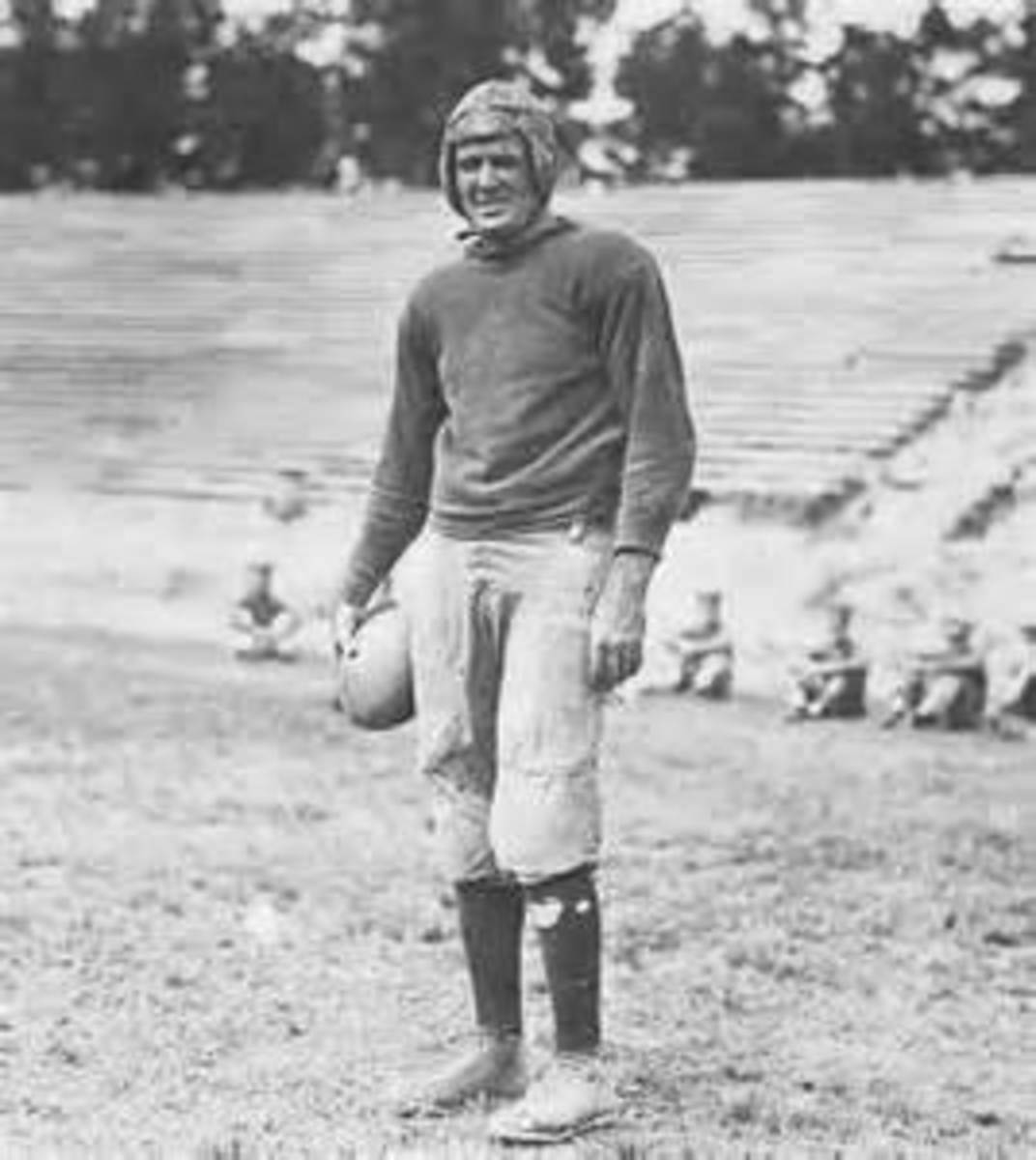
Goettge
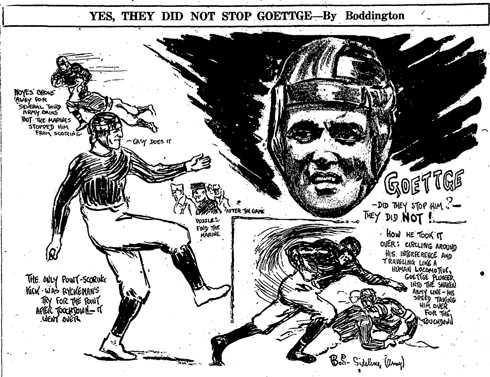
"The Great"
Choosing the Corps over a contract with the New York Giants, Goettge continues his climb up the ranks and resume of accomplishments ... in 1927 he is part of the American Legation in Peking, China, in 1929 he returns to Quantico as a captain, 1930 sees him as an aide-de-camp to the Commandant of the Marine Corps, Major General Wendell Neville, and then when Neville suddenly dies, an assistant to the new commandant, Major General Ben H. Fuller, with additional duties posted to the White House until 1933. He is back at sea with the Marine detachment aboard the battleship, USS Pennsylvania until in June of 1935, he takes over the Marine detachment aboard the Ananapolis training vessel, USS Reina Mercedes. 1936 sees Goettge promoted to Major. More education, after his duties aboard the USS Reina Merecedes, he takes takes and passes Quantico's senior course for officers, and in 1938 is second in command of the Marine basic school at the Philadelphia Navy Yard where he began his own Marine career. Serving under Colonel Clifton B. Cates (another future Marine Corps commandant), in 1940 he becomes a Lt. Colonel. In July of 1941, Goettge is assigned to the First Marine Division and joins its headquarters staff as the division's Chief Intelligence Officer (D-2), reporting to Major General Alexander Vandegrift (another future Marine Corps commandant). Prior to the invasion of Guadalcanal as part of Operation Watchtower, Goettge spends time in both Australia and Wellington, New Zealand, trying to obtain as much information as is possible about both the island and the enemy soldiers stationed there. Shortly before the landing on Guadalcanal takes place, Goettge is promoted to full colonel.
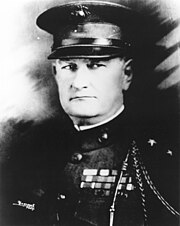

Neville & Fuller
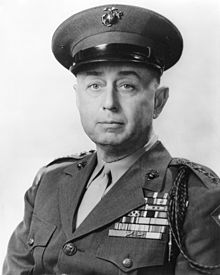

Cates & Vandegrift

En Route To Guadalcanal - Vandegrift
And Staff - Goettge Is Second From Right
In business as soon as he lands on the island, Goettge and his section are soon busy collecting information from materials the Japanese have left behind in their flight into the jungle, translating documents, interpreting film, looking at souvenirs, and trying to find a location within the Marine perimeter in which they can conduct their intelligence operations on a permanent basis. On Wednesday, 8/12/1942, Goettge believes he has received an early Christmas gift in the form of a captured Japanese Marine, Warrant Officer Tsuneto Sakado, captured skulking around the Marine lines looking for food (not throwing his arms up quickly enough, his companion is gunned down a patrol from the 3rd Battalion, 5th Marines). Given food, and plied by generous amounts of whiskey, Sakado tells a story of more starving and leaderless Japanese that want to surrender near the Matanikau River to the west ... information which corresponds to the sighting of a white flag on a tree in the region (which unfortunately is a Japanese battle flag that the wind has folded over so it only shows white). Thinking of the possibilities the information could provide, Goettge has First Sergeant Steven Custer assemble a patrol to go out and get the Japanese, one which the colonel will lead himself. Though a handful of the division's staff warn of the dangers, Vandegrift does not stop Goettge from going, persuaded by the colonel's claims that there might be a hundred Japanese ready to surrender.
 Goettge And Captured Japanese Money - 8/12/1942
Goettge And Captured Japanese Money - 8/12/1942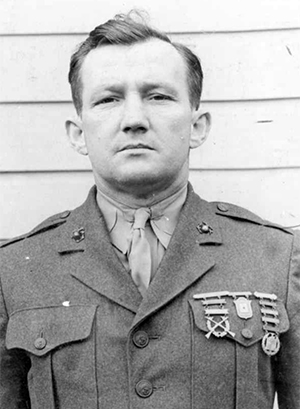
Custer
At first, composed as a combat patrol and set to leave as soon as possible, the mission morphs into a humanitarian hike with intelligence personnel replacing riflemen ... Goettge will lead the patrol of 25 men, including the 5th Marines' surgeon, Lt. Commander Malcolm L. Pratt, Captain Wilfred Ringer, Custer, Lieutenant Ralph Corey (who is fluent in Japanese), Sergeant Frank Few, Sergeant Charles "Monk" Arndt (he picks up the nickname when serving in Puerto Rico, he climbs a coconut tree ... it is Marine shorthand for monkey), and Corporal Joseph Spaulding. Traveling light, the mission expected to be over in a day, the men of the patrol carry only enough food for a single day, a canteen, a poncho, and only light weapons ... damaged by salt water in the invasion, they leave the Marine perimeter without radio equipment ... 25 soldiers of the 1st Marine Division, and one reluctant Japanese Marine, Sakado, with a rope around his neck. Just before departing from the 5th Regiment's Command Post, they are warned by the regiment's executive officer, Lt. Colonel Bill Whaling, to stay clear of the area between the Matanikau River and Point Cruz, due to the aggressive Japanese defense of the region. Twelve hours late due to the changing nature of the mission and composition of the patrol, the men leave Kukum in a Tanker Light craft at 6:00 in the evening ... only three of the men will ever be seen again.

Whaling Later In The War

Tank Lighter Craft
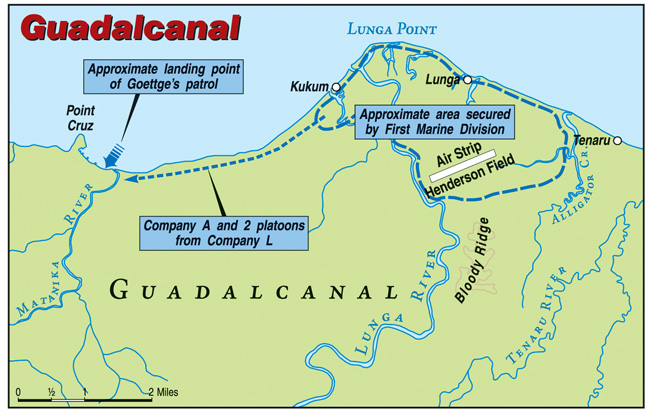
Site Of The Mission
Darkness of a moonless night falling like a light switch has been turned to off, at sea, things immediately gone wrong ... a flare is seen to the east, and thinking it is a signal to return (it isn't), the landing vessel makes it way back to Kukum, off once more, dark of water on dark of sky on dark of foliage, Goettge has trouble finding the correct landing point, and when he tells the operator of the landing craft to proceed towards shore, the vessel becomes stuck on an unseen sandbar. Reverse gunned, the landing craft frees itself, but the noise of its racing engines has alerted the Japanese soldiers of Lt. Soichi Shindo to the presence of the American Marines. As prisoner Sakado begs the mission not to go ashore, the mission wades in on a beach about 200 hundred yards west of the Matanikau River ... exactly where they have been warned not to go. Moving forward towards the jungle, Goettge holds a quick council of war with his command, ordering the patrol to form a defensive perimeter on the beach, while he explores the treeline to their front with Custer, Ringer, and the protesting Sakado on his rope leash. It is roughly 10:00 in the evening.

Ringer Between His Parents
Only a few yards into the jungle, two rifle shots ring out and Goettge falls dead from a bullet that hits him in the head (he is 46), companioned in death by a no longer protesting Sakado ... then a machine gun opens up and seriously wounds Custer. Both men returning fire, Ringer and Custer both manage to make their way back to the Marines on the beach. Verifying the colonel is dead, Few, Spaulding, and Arndt crawl forward, find Goettge's body, and remove his wristwatch and insignia so the commander can not be identified by the Japanese ... actions that get Few wounded in the leg and arm by a Japanese soldier that Few kills, along with shooting a sniper out of a tree with Arndt's pistol. Suddenly in desperate straits with unseen enemies firing on them from three sides, Ringer takes command of the patrol and orders an S.O.S. be fired into the night sky at the water's edge using the tracer rounds of a machine gun ... seen at Kukum, the message is not understood. Then he asks Arndt to swim back to the Marine perimeter for help, a journey of five miles which the tree climbing sergeant from Mississippi agrees to try. .45 strapped inside his helmet, Arndt uses the weapon to kill a Japanese soldier near the mouth of the Matanikau River, goes into the water, and swimming in his boondockers (he can't remove his boots because he has knotted his shoelaces in place), only twenty yards from shore, is cut up and tired fighting waves and coral, until exhausted, he swims back on to a beach, where he fortuitously discovers a front damaged canoe that by leaning back in its stern, he can paddle the last two miles to safety, forgetting the night's password, "Lillian" (it is believed the letter "L" is hard for the Japanese to pronounce), he yells "Million!" over and over, and not shot, is wrapped in a blanket and tells the patrol's story of need at about 5:00 in the morning ... mission achieved, it is decided that matters will only be made worse by attempting a rescue in the darkness, and relief for the patrol awaits the coming of dawn.

Colonel Goettge
"Monk" Arndt
For nine hours the patrol is assaulted, but fights back as best they can ... Custer is treated by Dr. Pratt, but soon Pratt is hit too, and though he continues to treat the men of the patrol, eventually he is hit a second time in the side and dies on the beach, where Custer also succumbs. They will not die alone. Flares sent aloft by the Japanese to improve their aim, blonde joker Corporal Hebert E. Benson, Private First Class Daniel L. Gauntt of Philadelphia, map and photography specialist Corporal Jack F. Lyons, Private Jack B. Kelly (a Marine of less than eight months), 17-year-old Private Robert W. Lovelace from Kentucky (the youngest member of the patrol), Corporal Stephen Serdula of New York, former Paramarine Sergeant Robert J. Stanfill, map making scout Corporal Joseph Kashuba, former grocery store clerk Corporal Aaron L. Gelzer, Corporal Henry L. Kowal of New York, 18-year-old Corporal Robert R. Lyons, 20-year-old Sergeant David A. Stauffer, Corporal Theodore E. Raht (another January 1941 enlistee), translator Lieutenant Corey, Private First Class Blaine G. Walter of Pennsylvania, and draftsman Private First Class John L. Delano all perish in the night. Not knowing if Arndt has made it back to Marine lines for help, a desperate Ringer asks Corporal William Bainbridge to make another try, but Bainbridge is gunned down running along the beach before he can gain the water. Next up is Corporal Joseph Spaulding, who is shot at too, but makes the water ... exhausted and cut up by coral like Arndt, Spaulding eventually beaches himself, almost walks into a group of Japanese around a campfire, and talking his way into the Marine lines, arrives at Kukum at 7:30 in the morning.

Trapped

By dawn, only four men remain viable as fighters and Ringer decides the men have a better chance in the jungle ... moving forward, a corporal is killed before he can make it, and only steps into the foliage, Ringer and Sergeant Denzil Ray Caltrider are downed by machine gun fire. Only 22-year-old Sergeant Few of Buckeye, Arizona remains alive. Killing a Japanese soldier he sees sniping at wounded men on the beach, Few strips down to a pair of white silken boxer shorts he has liberated from captured Japanese supplies, and with machine gun and rifle bullets seeking him, worried about sharks in the water, makes a swim of over four miles back to Marine lines holding a coconut he believes will give him buoyancy. Totally exhausted, Few almost is shot coming ashore, but soon recovers enough to tell his tale ... and includes his horrific last sight of the patrol, he sees sabers flashing in the dawn's sunlight as the Japanese hack away at the wounded and already dead.
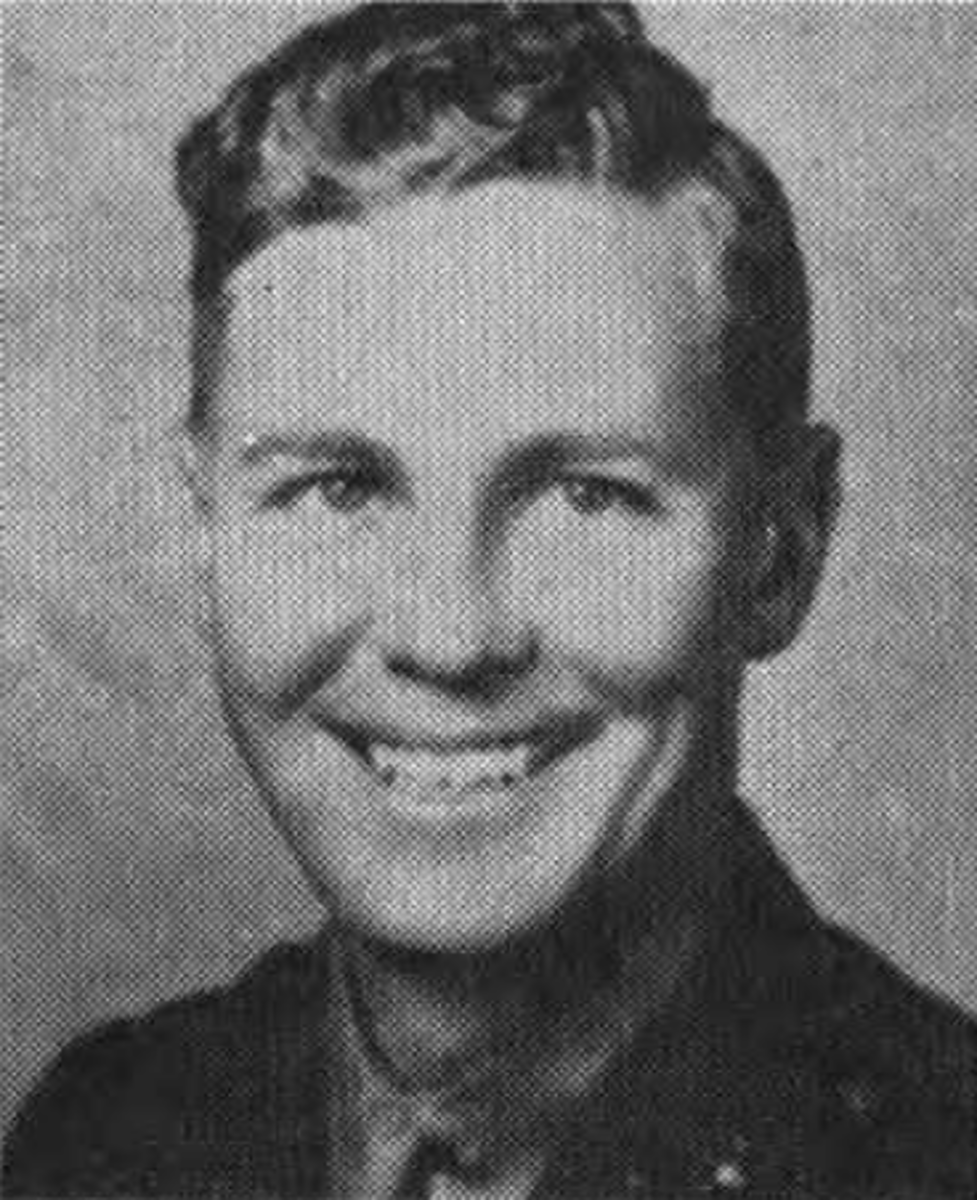
Caltrider
Though a rescue mission is sent out in the morning, and patrols comb the area in the days and weeks ahead, Goettge and his command are never seen again. Never seen again, but they are remembered with pride and anger as word of "sabers flashing in the sun" makes its way among the isolated Marines holding Guadalcanal's Henderson Field. A blood vendetta has begun between Imperial Japan and the United States Marine Corps, an abattoir of hate and gore that will stretch across the Pacific Ocean to Tokyo Bay, and soon it will be the Marines' turn for payback, when the 917 men of the Ichiki Detachment try to break the Marine line at the Ilu River (Alligator Creek to the men stationed there) shortly after midnight on 8/21/1942 ... charging barbed wire, machine gun positions, and pissed off Marine riflemen, 792 members of the force, including 49-year-old Colonel Kiyano Ichiki, won't be around to attack anyone else by the 22nd of the month.
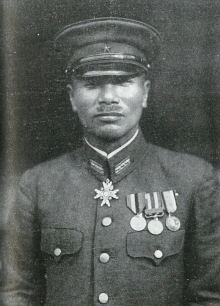
Ichiki
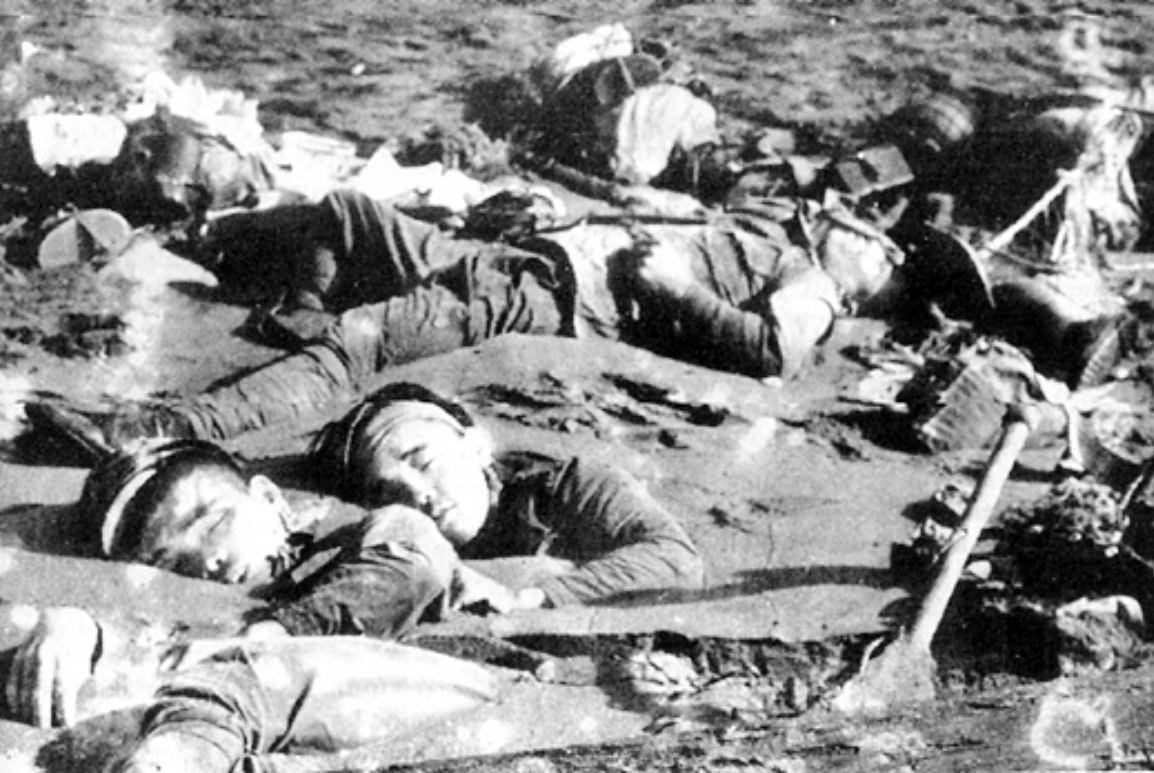
Ilu River Dead
The 1st MarDiv on Guadalcanal proudly earned the Nom De Gueere from the Japanese. The 'Butchers of Guadualcanal'! Semper Fi!
ReplyDelete0311 G/2/5 Nam Arizona Territory 68-69 'Bue Diamond'
Excellent read. Once the detail was started. no one is to blame for the outcome. The war was only months old, and what the Marines learned that this was not war games being played in boot camp.
ReplyDelete